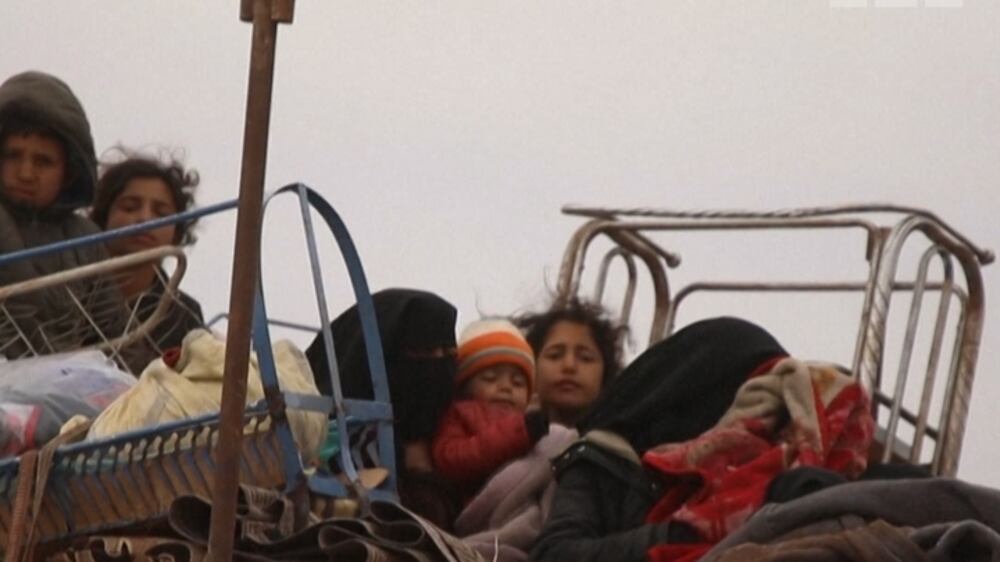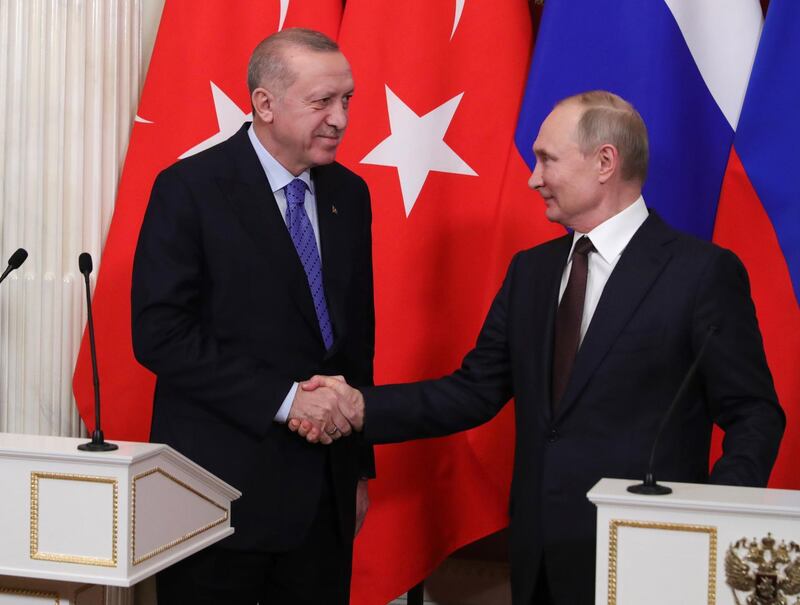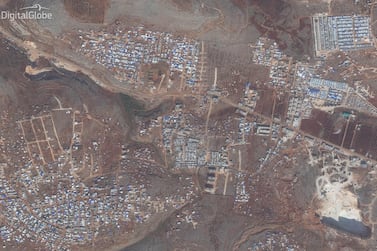A ceasefire agreed by Turkey and Russia took effect in Syria at midnight on Friday, in a move to halt intense fighting in Idlib that has sparked a humanitarian disaster and raised fears of their forces clashing.
With just minutes to go before the truce was due to come into force, however, bombings were still continuing, according to the Syrian Observatory for Human Rights war monitor.
Turkish President Recep Tayyip Erdogan and his counterpart Vladimir Putin met in Moscow on Thursday to discuss a path forward in the nine-year conflict which has killed and displaced tens of thousands of Syrians.
After the talks, Mr Erdogan said both sides were committed to working on a lasting ceasefire.
Mr Putin said he and Mr Erdogan reached an agreement on a joint document during the talks in Moscow that lasted for more than six hours. He added that he hoped it would "serve as a good basis for ending fighting in the Idlib de-escalation zone and ending the suffering of the civilian population".
Russian Foreign Minister Sergei Lavrov said the agreement included a “humanitarian corridor” in Idlib province, which has seen almost one million people displaced as the Assad regime mounted an offensive to regain territory from opposition rebels.
The corridor would extend 6 kilometres north and south from the M4 motorway, which runs south of Idlib city, and be patrolled by both sides, a joint statement said.
Why has Syria's civil war come down to Idlib?

Mr Erdogan said his country would work with Russia to ensure aid reached people camping in displacement camps along the Turkish border in Syria.
It came as 14 civilians were killed by air strike in Idlib on Thursday in a strike on a rebel-held village.
The strike hit a poultry farm where displaced families were sheltering in the early hours, opposition activists said.
The activists blamed Russian warplanes for the strike on Maaret Musreen village, which is home to thousands of internally displaced people. Eighteen people were also wounded in the strike and children were among the dead, the Britain-based SOHR said.
The White Helmets also blamed Russian warplanes for the strike and reports on the numbers of dead ranged between 14 and 18.
The attack came hours before the crucial meeting between the Turkish and Russian leaders.
"The situation … in Idlib has become so aggravated that it requires us to have a direct personal conversation," Mr Putin said at the start of the meeting.
Mr Erdogan said "the entire world has its eyes fixed on us," at the start of the talks, stressing that decisions were needed to "calm the region and our two countries".
Both sides have suffered losses in the nine-year conflict, for which the two nations are the main power brokers supporting rival sides.
"We need to talk about everything, so that nothing like this happens again and it does not destroy Russian-Turkish relations,” Mr Putin said.
As the meeting began, Turkey announced that another Turkish soldier was killed in an attack in Idlib on Thursday, raising the number of Turkish soldiers killed in the past 36 hours to three.
Nearly a million people have been displaced by the fighting in Idlib — Syria’s last remaining rebel stronghold — and hundreds have been killed. Many of the displaced have fled north towards the sealed border with Turkey.
Violence has worsened in Idlib in recent weeks, with Turkey sending thousands of troops into the area to support Syrian insurgents holed up there. But Mr Erdogan hasn’t been able to halt Syrian President Bashar Al Assad’s offensive, which began in early December.
Syrian and Turkish troops have engaged in deadly battles, leaving at least 59 Turkish soldiers dead since the beginning of February as well as scores of Syrian soldiers. Direct fighting between Turkish and Syrian government forces had previously been rare throughout the war.
A young man who said he survived Thursday’s attack told The Associated Press he was inside a building with his father when the air strike hit. He suffered a minor injury to his face. He said he called out and searched for survivors, and that an ambulance arrived at the same time as his father escaped the destroyed building.
Paramedics were seen removing debris before dawn Thursday, using torches to reach some of the victims buried under the rubble.
Photos of the strike posted by the White Helmets, also known as the Syrian Civil Defence, showed paramedics using a bulldozer to remove a ceiling that had apparently collapsed on top of people. The group said it had finished recovering bodies from under the rubble by Thursday morning.







